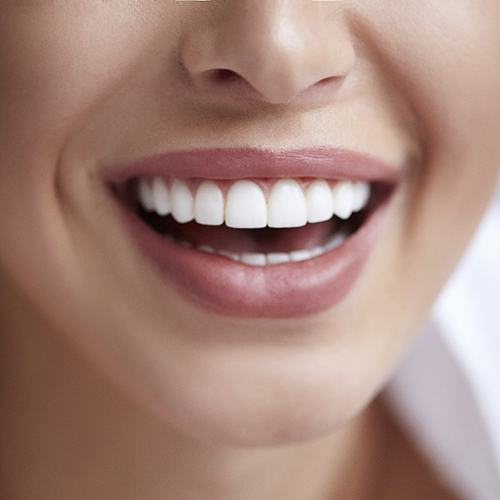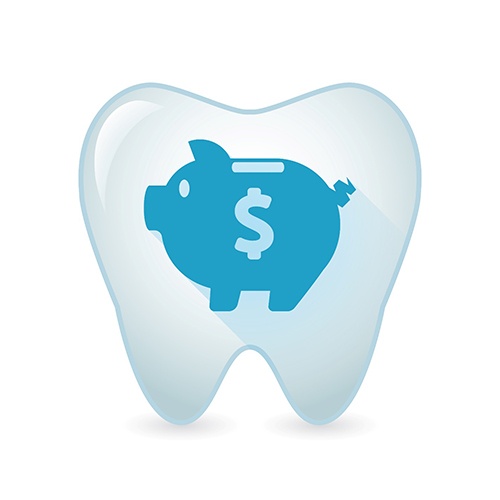What Are Dental Veneers?
Veneers are thin shells of tooth-colored porcelain that are placed over the front-facing surfaces of the teeth to mask cosmetic imperfections. Porcelain is durable and natural-looking, so no one will even be able to tell that it isn’t your natural tooth enamel. Veneers can be used to address teeth that are chipped, gapped, misaligned, misshapen, discolored, undersized, and otherwise cosmetically flawed. At Total Dental Solutions, we offer three different types of veneers to cater to different needs. Here’s how they work:
- Porcelain Dental Veneers — These traditional veneers closely match the translucent quality of your natural enamel.
- E-max Dental Veneers — These thinner veneers are also translucent like natural teeth and are extremely durable.
- Lumineers — These veneers typically do not require any anesthetic because they are so thin, and they do not require any preparation of your natural teeth. Usually, we can place them in just two visits!
The Process of Getting Veneers
Veneers are usually placed in two appointments. During the first visit, your dentist will prepare your teeth by filing down a minimal portion of your enamel. This ensures that the veneers don’t appear or feel bulky. If you are getting Lumineers, this step is not necessary.
After the prep is complete, impressions are taken and sent to the dental lab. You will be given temporary veneers to wear until your final restorations are ready. In just a few weeks, you can return to the practice to have your permanent veneers placed. Once everything looks and feels great, you will be free to show off your new smile to the world!

The Benefits of Veneers
Veneers provide numerous benefits. Here are some of the most notable ones you can enjoy:
- Natural-Looking: The materials used to make veneers look very similar to natural tooth enamel.
- Quick Process: Veneers can be placed in as few as two appointments.
- Teeth Whitening: Veneers are more resistant to staining than tooth enamel, so you don’t need to worry as much about discoloration. Veneers can also be shaded to be the exact shade of white that you want, so you can show off a brighter smile.
- Long-Lasting: When cared for properly, veneers can last 15+ years before needing to be replaced.

Understanding the Cost of Veneers
If you’re interested in upgrading your smile with veneers in North Naples, you may be wondering how much they cost. While there is no one-size-fits-all answer, there are certainly a few things to consider as a prospective patient. Read on to learn all about the price of veneers, how they stack up to other smile-enhancing treatments, and ways to make the cost more affordable!
Read More
The Cost of Veneers Compared to Other Cosmetic Treatments

Veneers are a sought-after cosmetic dental treatment, but there are other options. Here’s how the cost of veneers in North Naples compares to other popular smile-enhancing services:
-
Braces – This tried-and-true teeth-straightening treatment can address everything from minor crowding to severely gapped teeth. Typically, the price tag is $3,000-8,000 which depends entirely on your dental needs. Unfortunately, this only addresses the position of your teeth, not the shade and shape.
-
Teeth Whitening – Professional teeth whitening treatments are safe, customized, and effective. On average, in-office treatments cost $500-700 and at-home kits generally run $300-400. While both in-office and take-home options can blast away stubborn stains, the position and shape of your teeth will remain the same. As a result, you will need to factor in the cost of additional cosmetic dental services if you have misaligned, chipped, or otherwise flawed teeth.
-
Dental Bonding – Dental bonding has a lower upfront cost ($300-600 per tooth) and can correct minor gaps between teeth, unsightly chips, pigmented discoloration, and more. It is important to remember, however, that the results typically only last for a few years at a time. Therefore, the long-term cost is higher than you might think.
-
Veneers – Veneers are incredibly unique since they can address a multitude of cosmetic dental flaws, are completely customizable, and can last for decades with proper care. In short, while the upfront cost (generally $1,000-2,000 per tooth) may be higher, the tremendous benefits make them well worth it. Plus, there are ways to make the total amount more affordable.
How to Make Veneers Affordable

Veneers typically aren’t covered by dental insurance providers. Our cosmetic dentist in North Naples has an option to make achieving your smile goals more affordable. With our Direct Dental Savings Plan, for one year you receive 20 percent off all cosmetic treatments! This plan offers savings on a lot of other dental services, so be sure to contact us for further details. CareCredit financing is also available. Dr. Hoop offers an $87 Cosmetic Dental Consultation wherein he’ll listen to your goals, examine your mouth, go over treatment options, and he can even create a digital mockup of what your smile would look like after undergoing various treatments!
Veneers FAQs
Unsure if veneers in North Naples are the type of cosmetic treatment you need? With so many options available, it’s best to talk with your cosmetic dentist to determine if this permanent solution will lend you the results you hope to see. Known for their permanence and transformative capabilities, patients enjoy the newness and life-changing aesthetics of these unique, customizable restorations. But before you jump into treatment, we invite you to review the following questions asked by previous patients. If you do not see yours listed, please feel free to call us and schedule an appointment to inquire more about veneers.
What happens to teeth underneath veneers?
The teeth that exist underneath your veneers are natural tooth enamel. Veneers only fit over the front surface, which means the sides and backsides of your teeth remain exposed and vulnerable. This is why your cosmetic dentist in North Naples places a heavy emphasis on maintaining optimal oral hygiene. You must continue to brush, floss, and rinse regularly as well as see us every six months for regular dental checkups and cleanings. This will prevent cavities, tooth decay, and gum disease – all of which can negatively impact your veneers.
Can I drink coffee with veneers?
Yes, you can drink coffee with your veneers, but you’ll need to be mindful of how much and how often. Although the materials used to create your veneers is made from high-quality porcelain, it can become discolored over time. If you continue to consume dark-colored beverages known for causing stains, there is a chance your restorations will begin to dull and lose their vibrance. The only way to prevent this is to avoid stain-causing foods and beverages or practice optimal oral hygiene immediately following consumption. You can also drink with a straw to limit the amount of exposure between the liquid and your veneers.
Can you whiten veneers?
No, you cannot whiten veneers. Unfortunately, their materials are not porous like traditional tooth enamel, so there is nothing for the whitening agent to bleach. If you’re worried that your teeth will not look the same color, it’s recommended that you seek teeth whitening before undergoing veneer treatment. This will ensure all your teeth match when it comes to color, so your veneers blend in with the brighter, whiter color. Otherwise, you’ll be expected to have your veneers replaced if you want your entire smile to match.
Who is not an eligible candidate for veneers?
Most people are eligible to receive veneers, so this should make you feel more comfortable. However, there are certain cases that will likely have your dentist recommending alternative solutions or having you wait to pursue veneers. These include:
-
Tooth decay/cavities, as they can make it much harder to receive veneers and maintain them without the expense of removing them to treat your oral health problem.
-
Gum disease, as a recession is common with oral health issues. If your gums expose too much of the tooth root, we’ll need to recommend recontouring before placing your veneers to avoid potential exposure of the area between your gum line and veneers.
-
Bruxism, as it can cause you to accidentally damage your veneers. When grinding your teeth, you may not realize you’re doing it, but before you know it you might chip, break, or damage a real or artificial tooth.

